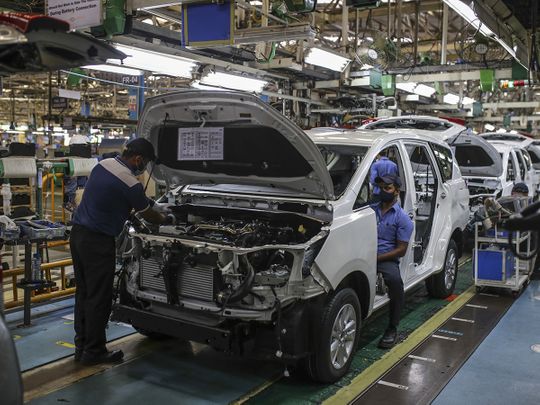Dubai: Although a vaccine is a widely seen improving India’s economic outlook next year, a number existing issues are expected to persist well into 2021 and beyond.
“The distribution of an effective COVID-19 vaccine in India will brighten the economic outlook next year, but India’s recovery will still be one of the weakest among major economies,” opined Shilan Shah, senior India economist at Capital Economics.
A report by Oxford Economics last month revealed that India would be the worst-affected economy even after the pandemic eases, stating that annual output would be 12 per cent below pre-virus levels through 2025.
“One consequence is that government bond yields will remain exceptionally low, although we think that the rally in local equities has further to run,” Shah added. “Meanwhile, the reform agenda that matters for long-term prospects is likely to take a breather in the first half of the year as several state elections loom.”
Vaccine news improve grim outlook
Amid raging doubts on how soon India’s economy would stage a comeback post pandemic, the news of vaccines and hints of slightly better economic data had improved an earlier grim outlook for the country.
The contraction of India’s GDP by 7.5 per cent in July to September quarter, from a 23.9 per cent decline witnessed in April-June quarter, was widely seen among analysts and economists as an arrest of the slide and a steep contraction recorded in the prior quarter.
“COVID-19 has ravaged India’s economy in 2020, and GDP is all but certain to have suffered its largest slump on record this year,” noted Darren Aw, Asia economist at Capital Economics. “But there are reasons for optimism as the year draws to a close.”
Continued recovery seen this quarter
“Several activity indicators point to a continued recovery in the fourth quarter from the depths of the lockdown,” Aw said. “Our tracker has picked up steadily throughout this quarter, and is now around 20 per cent below the pre-virus level.”
India continued to add less than 25,000 new COVID-19 cases for a week straight now, the infection tally falling at a time when concerns about a mutant strain of the virus from UK forced new restrictions across various cities and states.
“New virus cases have dropped sharply from their September peak and are now at their lowest level in six months,” Aw added. “And there is growing hope that a vaccination program in India could begin as early as January.
“All of this underpins our forecasts for GDP growth to rebound by 12 per cent in 2021, stronger than the latest consensus expectation of growth of 9.7 per cent.”
Central bank economic view improves
India’s central bank recently expressed satisfaction over the country’s recovery from the COVID-19-induced slowdown, but believes inflation needs to be kept in check.
The Reserve Bank of India’s bulletin for December says more evidence of a recovery has emerged since its November bulletin and that the economy is “reflating at a pace that beats most predictions.” Moreover, analysts view this recovery may help post a minor growth in the quarter.
“The now casting assessment presented in last month’s bulletin indicates that real gross domestic product growth is expected to break out into positive territory in the quarter – albeit, to a slender 0.1 per cent,” it stated.
Eyes on RBI inflation target
“The government is due to issue the RBI with a new inflation target next year, and there are suggestions that it is considering relaxing the existing framework perhaps by widening the ‘tolerance band’,” Aw added.
“But there isn’t any evidence that the current set-up is forcing the RBI to keep policy tight. Instead, its credibility has delivered lower and more stable inflation without requiring interest rates to be high. Changing the framework after only five years would be a mistake.”
India’s goods trade deficit widened again in November and is set to reach its pre-pandemic levels over the coming months, especially given recent positive developments on a COVID-19 vaccine. “But we think the external risks will remain manageable,” noted Aw.



